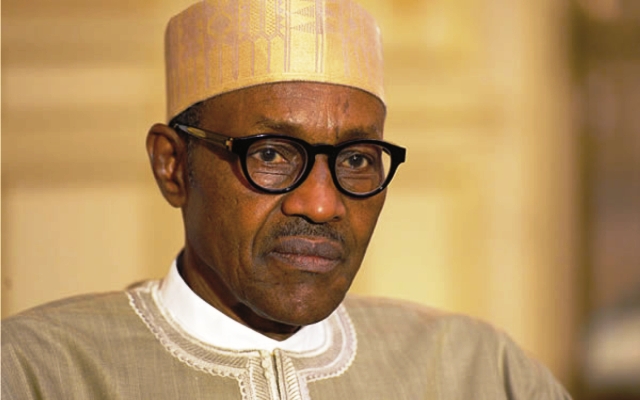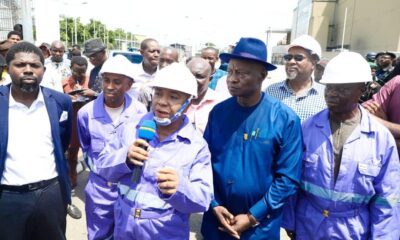Oil & Energy
Kerosene Scarcity: Housewives’ Nightmare

The scarcity of Read
Kerosene product which is daily used to power stoves for the preparation of meals in most Nigerian homes has become a nightmare to most housewives and other users of the product across the nation.
The product is hardly found in the filling stations and amongst the few selling it the price skyrockets to N220.00 as against the recently official price of N130 per litre pegged by the Federal Government.
As a result of this ugly situation most homes who rely on the product for preparation of food for their families and to feed their lanterns, especially at this present era of epileptic public supply of electricity, resort to roadside hawkers where the price is even higher.
Amongst 21 filling stations visited by our correspondent in Port Harcourt, only three had the product to sell and customers buy at N220 and above against the N130 recently fixed by the Federal Government.
At Oando filling station, along Ikwerre Road, the attendant said that had for over three months, they have not got Kerosene to sell to customers.
The attendant who pleaded anonymity said, myy brother, even myself selling in a filling station, I find it difficult to get kerosene for my family use. Whatever is the reason behind the scarcity is what I cannot explain. But the reality is that most filling stations don’t have kerosene supply from the depot”.
A housewife, Chidinma Okere, who lives in Diobu told The Tide that for the past six months, she had stopped going to filling stations to look for kerosene because “each time I go they tell me, there is no kerosene”.
“The only option left for me is to rely on the street hawkers for purchase at skyrocketed price of N250.00 and above per litre,” she noted.
Okere explained that the issue of scarcity and attendant high price of kerosene has become the biggest challenge confronting housewives and most others who use the product as source of fire to prepare meals daily for their families.
“The price of gas has gone high, the electricity supply is hardly seen. Tell me what the government people want us to do in this kind of situation”, she said.
The situation appears to be more serious in the hinterland as most users of the product rely on crude sources of energy which provide alternative sources to kerosene.
A teach in a primary school in Mba Community in Etche Local Government Area of Rivers State Mary Amakolonwa, told our correspondent that, “instead of using kerosene stove, I now use firewood to cook my meals”.
Amakolonwa explained that the high price of the product which has gone far above the purchasing power of the common housewife has pushed up the demand for firewood resulting in high price.
“A bunch of firewood which sellers beg you to buy at N150.00 few months ago goes for N250.00 today”, she said explaining that a bunch hardly serves a large family for more than one day.
The use of firewood was discouraged by the Federal Ministry of Environment which few years ago was initiating a cleaner energy project that requires cheap cooking gas as a way of saving the environment from pollution and protection of ecology.
But with the negative impact of the Kerosene product scarcity and high price, an estimated 30 million homes that use kerosene are today resorting to other alternatives most of which endanger the environment.
Investigation by The Tide revealed that the major cause of kerosene scarcity hinges around the complexity in getting foreign Exchange (FOREX) by the petroleum products marketers.
A source from the Independent Petroleum Marketers Association of Nigeria (IPMAN) told The Tide that most of its members have not imported kerosene for several months because of the difficulties in accessing Forex.
“You know that NNPC is now the major importer with the major marketers called MOMAN. I as a marketer am not prepared to go through the hurdles involved in importation of kerosene”, said the source.
The source who pleaded that his name should not be mentioned, revealed that IPMAN has however, been assured of FOREX by the Federal Government to enable members import products.
“How feasible this Federal Government promise will be is not what anybody or member of IPMAN can guarantee you. However let us hope that government on its side will live up to its promise”.
The National President of IPMAN, Comrade Chinedu Okoronkwo had two weeks ago also said that the association was partnering with some major stakeholders in the oil industry to import kerosene.
The association’s boss who noted that the hardship being faced by the masses on kerosene was as a result of scarcity assured that the body had got licence to import both kerosene and diesel to ease the hardship.
A housewife in Diobu Mrs Celine Johnson, views the scarcity of kerosene as an act of sabotage to Nigerians and accused the Federal Government of either not being proactive or insensitive to what concerns the ordinary Nigerian.
“How really can you imagine that ordinary kerosene will also be so scarce that a poor woman would be made to pay over N200 to buy a litre in a country so blessed with huge deposits of crude oil?
“If the government actually cares for us, having known that the refineries are dead, they should have known within government plans the volume of the products the masses use and import it so that we are saved from this horror”, she said, noting that it was because government do not care about the masses that voted them into power.
“I have electric system I use for preparing my family meals, but that I can’t use and have not used for the past six months because the so called public supply of electricity is an issue beyond everybody. The gas has become another huddle because it is also scarce and very costly.
“I beg the government people to please consider what we are passing through. They should not be telling us about how much they are stealing at the National Assembly, NNPC, other Federal and State agencies, they should please give us kerosene because we are helpless”, she remarked.
Another respondent, Clarkson Ebi, also blamed the government for the situation, noting that the government has the capacity to change situation but appear not to be ready to do so.
“I heard recently that Federal Government has hiked kerosene price to N130.00 per litre and if you had gone to the filling stations, you hardly find the product to buy and amongst the one or two filling stations that are selling, they sell above N220.00 how many of them have been arrested by the government for contravening the directive?
“Government is only interest in fixing price but to get up from the seat and find out what happens in the field is not considered important because it concerns the poor masses”, Ebi said.
Ebi commended the Rivers State Governor, Chief Nyesom Wike for setting up a committee to monitor petroleum products in the state, saying the government took a laudable step.
He however urged the governor to prevail or mandate the committee to ensure that products meant for the state were not diverted to other states or outside Nigeria.
A public analyst, Chidubem Bon, however expressed doubt on the ability of both government and the petroleum marketers to provide lasting solution to the issue of product scarcity as long as they rely on import.
He said: “How can you rely on importation to serve a large country like Nigeria when God has blessed us with huge oil and gas deposit?
“At global level Nigeria is amongst the highest producers of crude and gas, yet, you rely on foreign countries to handle refining of the products for you to buy and service a population of close to 200 million citizens”.
Bon urged government to practically encourage local refineries in the country so that we have a system that can be predictable and also engage our population in practical production as a way of increasing employment opportunities for Nigerians.
“Local refining will stamp out scarcity, boost export earnings for the country, create employment as well as boost wealth creation and end numerous avoidable social vices prevalent today in Nigerian society”, he said.
Another danger created by kerosene scarcity, our investigation revealed, is that, adulteration of the product has become prevalent, as records have shown that explosions have occurred in Port Harcourt and Obio/Akpor in some homes as a result of fake or adulterated kerosene.
The newly inaugurated committee on Petroleum Product Monitoring in the state should as a matter of urgency check a situation where filling stations lack kerosene, yet hawkers have the products to sell.
Checks reveal that the few filling stations prefer selling to bulk buyers at higher prices, who in turn sell to the street sellers at exorbitant prices.
Chris Oluoh
Oil & Energy
NSCDC’s Anti-Vandal Squad Uncovers Artisanal Refinery In Rivers Community

The Anti-Vandal Squad of the Nigeria Security and Civil Defence Corps (NSCDC), Rivers State Command, has uncovered yet another local refinery situated at Adobi-Akwa settlement in Etche Local Government Area of Rivers State.
The State Commandant, Basil Igwebueze, disclosed this while speaking to journalists shortly after the tour of the Illegal site.
Represented by the Head, Anti-Vandal Squad, CSC Peters Ibiso, Igwebueze said the squad made the discovery following a tipp off, expressing regret that no arrest was made as the boys fled the site upon sighting the squad.
The cammandant’s representative took the newsmen across a tick forest of about 6-7 kilometers from the main town.
The team sighted where the pipeline vandals tapped into the Well Head of yet to be ascertained multinational company, connected their galvanised pipes to several cooking pots, heat up the crude to produce Automotive Gas Oil (AGO).
In his words, “Upon receiving a tip-off, the Anti-Vandal operatives swung into action to uncover this illegal oil bunkering site. They were in this forest for two days having cordoned the area, unfortunately, the perpetrators upon sighting our men took to their heels, but investigation is still ongoing to effect the arrests of such defiant elements”.
The Anti-Vandal Unit Head further narrated the operation techniques of the operators of local illegal refineries from the point of extraction of crude through vandalism of oil pipelines to cooking in various ovens where the content is subjected to high temperature and transmitted through pipes to reservoirs for storage and onward trans- loading to buyers.
While insisting that the command would not relent in the fight against illegal dealings in petroleum products, he urged the public to have more trust in the NSCDC by providing actionable intelligence that would enhance possible arrest of economic saboteurs in the State.
“Our commitment to continuously work in tandem with the prosecutorial mandate of the corps in order to rid the State of economic saboteurs remains unchanged. We value our informants and most especially the intelligence driven tip-off received from time to time.
“It is also our duty to ensure that our source of information are not disclosed so as to protect our informants. It is therefore our delight that the public will continue to have confidence and trust in us as we together protect the nation’s critical national assets and infrastructure from dare devil vandals”, he stated.
By: Lady Godknows Ogbulu
Oil & Energy
Oil Fund Withdrawals Suggest Extended Price Rally

The world’s largest crude oil exchange-traded fund has bled over $2 billion in less than a year. And it i
s not due to investors finding greener pastures elsewhere with other ETFs; it is the siren call of soaring prices that is prompting this mass exodus.
The WisdomTree Brent Crude Oil exchange-traded commodity had assets under management of some $2.5 billion last summer, according to Bloomberg. Now, the publication reports, this is down to $396 million, with withdrawals accelerating over the past few days.
In that, withdrawals seem to be following price trends. Brent earlier this month topped $90 per barrel and, after a short pause earlier this week, is back above that threshold again following the latest Israeli strike on the Gaza Strip amid reports about a possible ceasefire.
While it is true that prices are currently driven higher mainly by geopolitical events, fundamentals are also at play. A growing number of forecasters are updating their predictions for benchmarks this year on expectations of resilient demand and increasingly tighter supply. And investors are following the trend.
Even those who have not sold their ETF holdings in order to invest more directly in the rally are benefitting. That same WisdomTree Brent Crude Oil ETC generated returns of over 13 percent during the first quarter of the year as opposed to an average 8.8% gain in the S&P 500.
The WisdomTree exchange-traded commodity became the world’s largest oil fund at the beginning of last year. The fund saw inflows of over $1 billion, which poured in as the deflation in oil prices that had begun in late 2022 extended into the new year. Now, the trend has reversed and it has reversed strongly.
The WisdomTree Brent Crude Oil ETC is not the only fund seeing outflows. The U.S. Oil Fund, which used to be the world’s biggest oil fund before the WisdomTree inflows last year and is now the world’s biggest oil fund once again, also saw a flurry of investor exits as benchmarks climbed higher.
According to Bloomberg, the fund’s assets under management currently stand at $1.3 billion, down from some $5 billion during the pandemic.
In further evidence that oil makes money, the Middle East is about to become the only region in the world with three trillion-dollar sovereign wealth funds. The Abu Dhabi Investment Authority is worth $993 billion, Bloomberg reported in March, while the Saudi Public Investment Fund and the Kuwait Investment Authority are breathing down its neck.
Meanwhile, investment in transition-related stocks is on the decline, according to data reported by Reuters. The S&P Global Clean Energy Index is down by 10% since the start of the year. In comparison, the S&P 500 Energy Index, which comprises Big Oil names, has gained 16.3%.
The data shows that investors are growing wary of all the promises made by transition advocates as evidence mounts that these were not based on due diligence. Wind and solar stocks suffered a crash last year when this first became clear.
Now, we are witnessing a continued awakening among investors to the challenges and the realistic potential of transition technology and alternative energy sources.
“With conventional energy having its own bull run, I think the alternative funds will struggle for the foreseeable future, and we shall see what the election brings”, the Managing Director of capital markets at Phoenix Capital Group Holdings told Reuters.
The comment summarizes the challenging situation for alternative energy investment and highlights the rebound of interest in oil and gas, much to the chagrin of decision-makers on both sides of the Atlantic.
In both Europe and the U.S., things can get even worse for the transition after the respective elections—in June for European Parliament and in November for U.S. President. It will certainly be an interesting year in energy.
Slav writes for oilprice.
By: Irina Slav
Oil & Energy
CNG Initiative: FG Targets 25,000 Jobs, $2.5bn Investment

The Programme Director and Chief Executive, Presidential Compressed Natural Gas Initiatives, Michael Oluwagbemi, has announced the Federal Government’s plan to target over 25,000 jobs and $2.5 billion worth of investment by 2027.
Oluwagbemi made this known during the Presidential CNG stakeholders’ engagement workshop held at BOVAS Auto-Gas Filling Stations, Ajibode Bus-Stop, in Ibadan, Oyo State capital, at the weekend.
He stated that the initiative, which was part of palliative measures to ease the burden of the removal of fuel subsidy, would attract enormous investment and job creation as well as impact positively on the lives of Nigerians.
Meanwhile, he called on Nigerians to embrace the new initiatives by the Federal Government as part of palliatives to cushion the effect of the removal of fuel subsidy in the country.
“On October 1, 2023, when the President gave his speech, he announced that the Presidential CNG initiatives are going to be rolled out as part of palliatives on the removal of fuel subsidy.
“One of our major concerns is to make sure that the transition for the transportation sector is a cheaper, safer, and more reliable source of energy.
“In the coming weeks, we are going to be announcing the conversion incentives programme which will enable Nigerians currently using PMS and Diesel fuel vehicles to be able to convert their vehicles at designated places across the country at a discounted price based on certain pre-qualification under the palliative programme of the Federal Government”, he said.
On the value chain of the initiative, Oluwagbemi explained that the Federal Ministry of Finance is acquiring tricycles and buses that would be assembled and manufactured in Nigeria, with more than five automobile firms being activated.
“The value chain of the programme starts with every one of us. From the point of converting your vehicle, you have created the demand for natural gas.
“If your vehicle is converted by technicians and refuelled by autogas workshops across the country, then you are creating jobs for civil engineers and technicians. You’re creating jobs for the upstream in terms of upstream activities associated with oil and gas.
“And in line with the programme, the Federal Ministry of Finance is acquiring a number of tricycles and buses that will be assembled and manufactured in Nigeria. More than five of our automobile firms have been activated. So, you can see that in terms of job creation, the opportunities for Nigerians are enormous.
“The President has said we need to convert one million vehicles by 2027. We need 1,000 conversion shops and we need over 3,000 filing stations just like this. You can imagine the level of investment required for this.
“In order to sustain one million vehicle conversions by 2027, we need 25,000 technicians. So, the job creation potential is an opportunity for job creation in addition to our gross domestic product, $2.5 billion worth of investment to be mobilised in the next four years and of course more than $25 billion added to our GDP”, he said.
Oluwagbemi further called on Nigerians to embrace the new initiatives by the Federal Government as part of palliatives to cushion the effect of the removal of fuel subsidy in the country.
The representative of BOVAS Filling Station, a private investor in the Presidential CNG Initiatives, Temitope Samson, said, “We have worked with the regulators, we are also working with the Presidential Initiatives on CNG to make sure that standard safety is adhered to. We have also worked with the Standard Organisation of Nigeria to ensure that we have a standard accepted internationally.
“Our role is to ensure that there is availability of CNG across the nation, and to also ensure we have enough kits and tanks that are converted for people to use as many as possible, and to ensure safety and to train others so that anywhere they get to, they have very safe conversion”.
Recall that last year, President Bola Tinubu approved the Presidential Compressed Natural Gas initiative(PCNG-i)
This initiative aims to not only introduce more than 11,500 new CNG-enabled vehicles and provide 55,000 CNG conversion kits for existing vehicles that depend on Premium Motor Spirit but also promote local manufacturing, assembly, and job creation.
-

 News1 day ago
News1 day agoBonny-Bodo Road: FG Offers Additional N20bn, Targets December Deadline
-
Business1 day ago
Nigeria Set To Get $2.25bn World Bank Loan … Plans Diaspora Bond
-

 Niger Delta1 day ago
Niger Delta1 day agoMile One Market: Committee Commences Verification Exercise …Denies Allocations Of Shops
-
Sports1 day ago
Chairman Lauds NPFL Referees Improvement
-

 News1 day ago
News1 day agoJAMB Arrests Father For Impersonating Son At Exam Centre
-
Women1 day ago
The Desire Of Every Woman In Marriage
-

 Featured1 day ago
Featured1 day agoBe Firm In Fight Against Oil Theft, Fubara Tells CNS …As Navy Moves Training Hqtrs To Rivers …Seizes 14 Vessels In Three Months
-
Business1 day ago
Diri Tasks NCDMB, SPDC On Projects Completion

